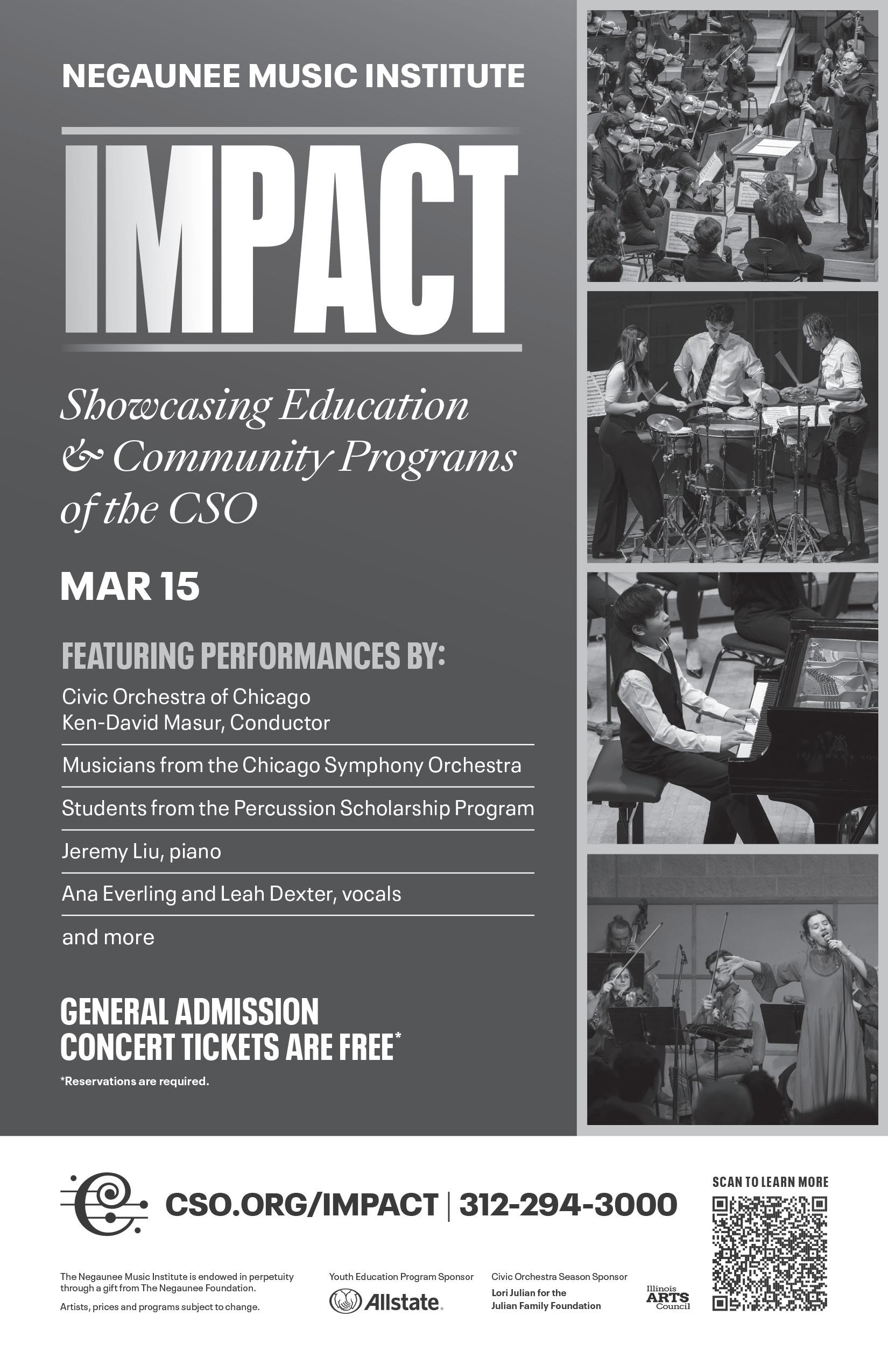CIVIC PLAYS THE PLANETS
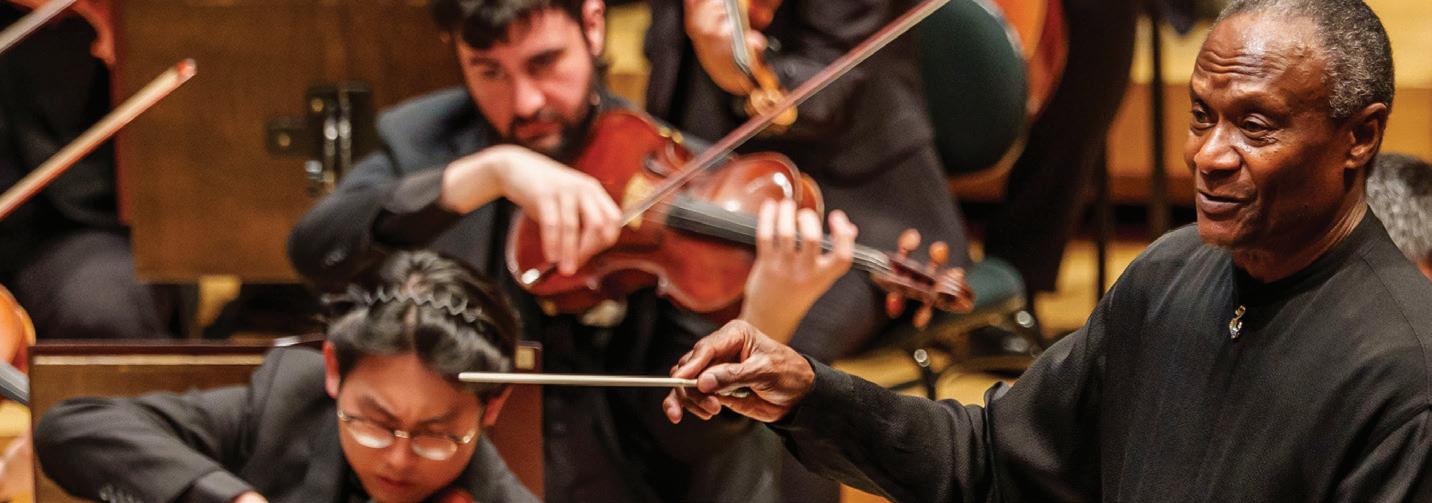
Thomas Wilkins conductor
Apollo Chorus of Chicago
Stephen Alltop music director and conductor
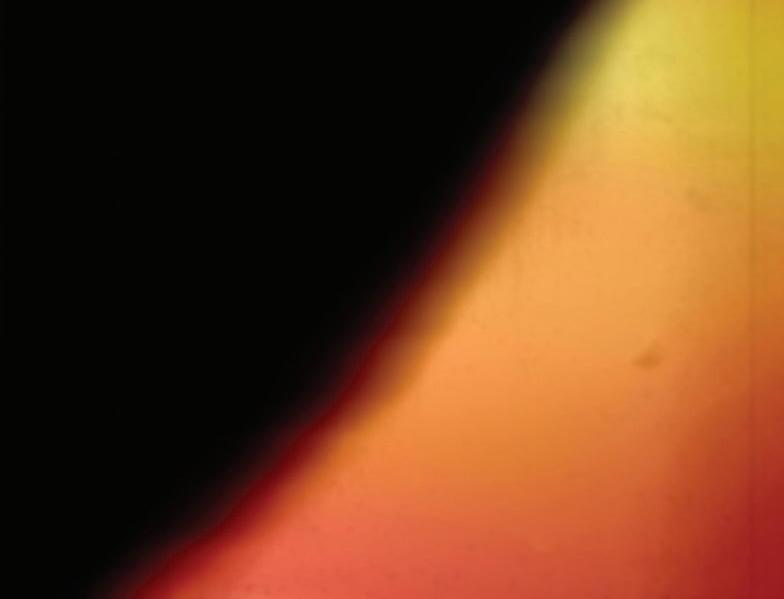
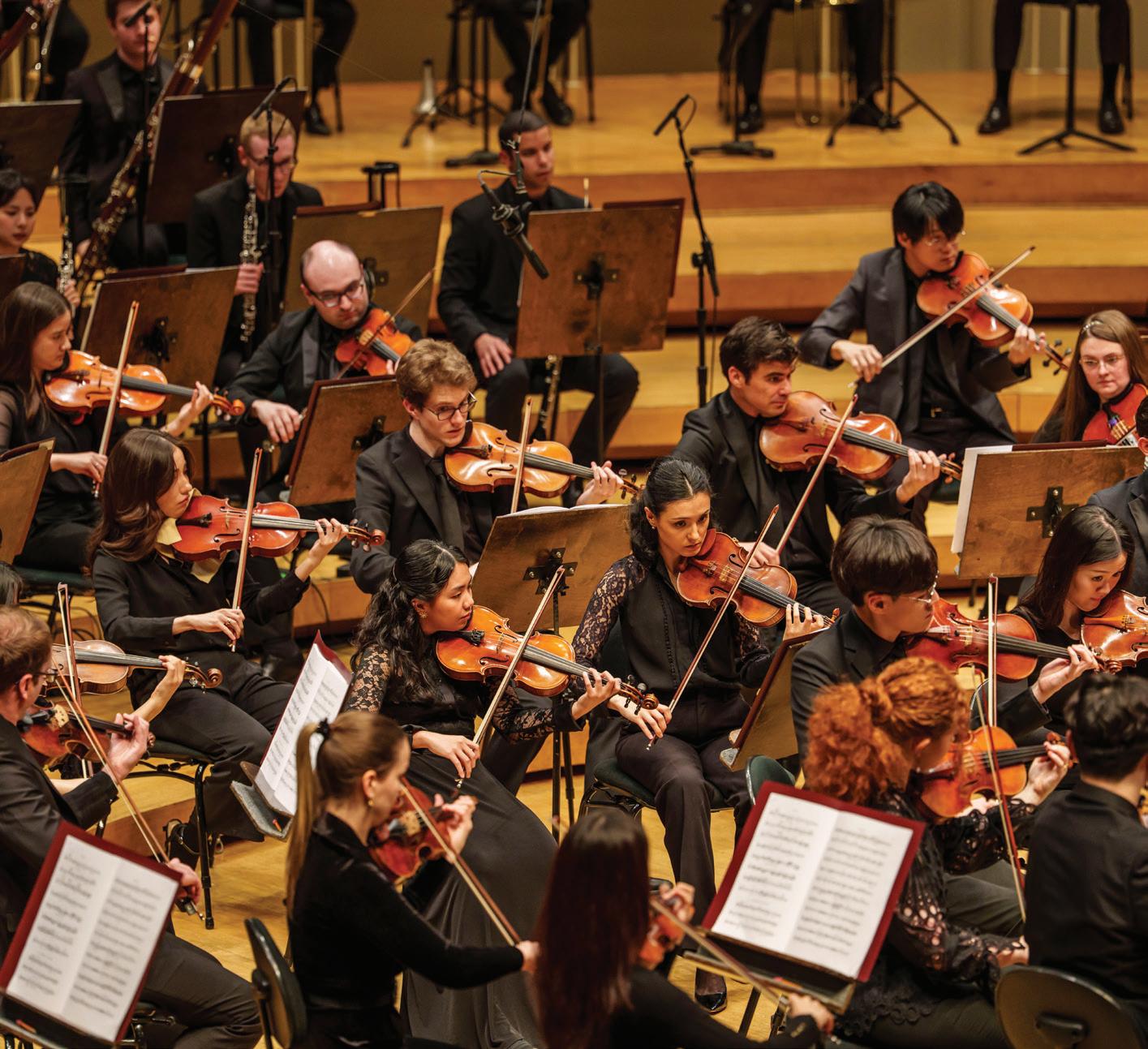
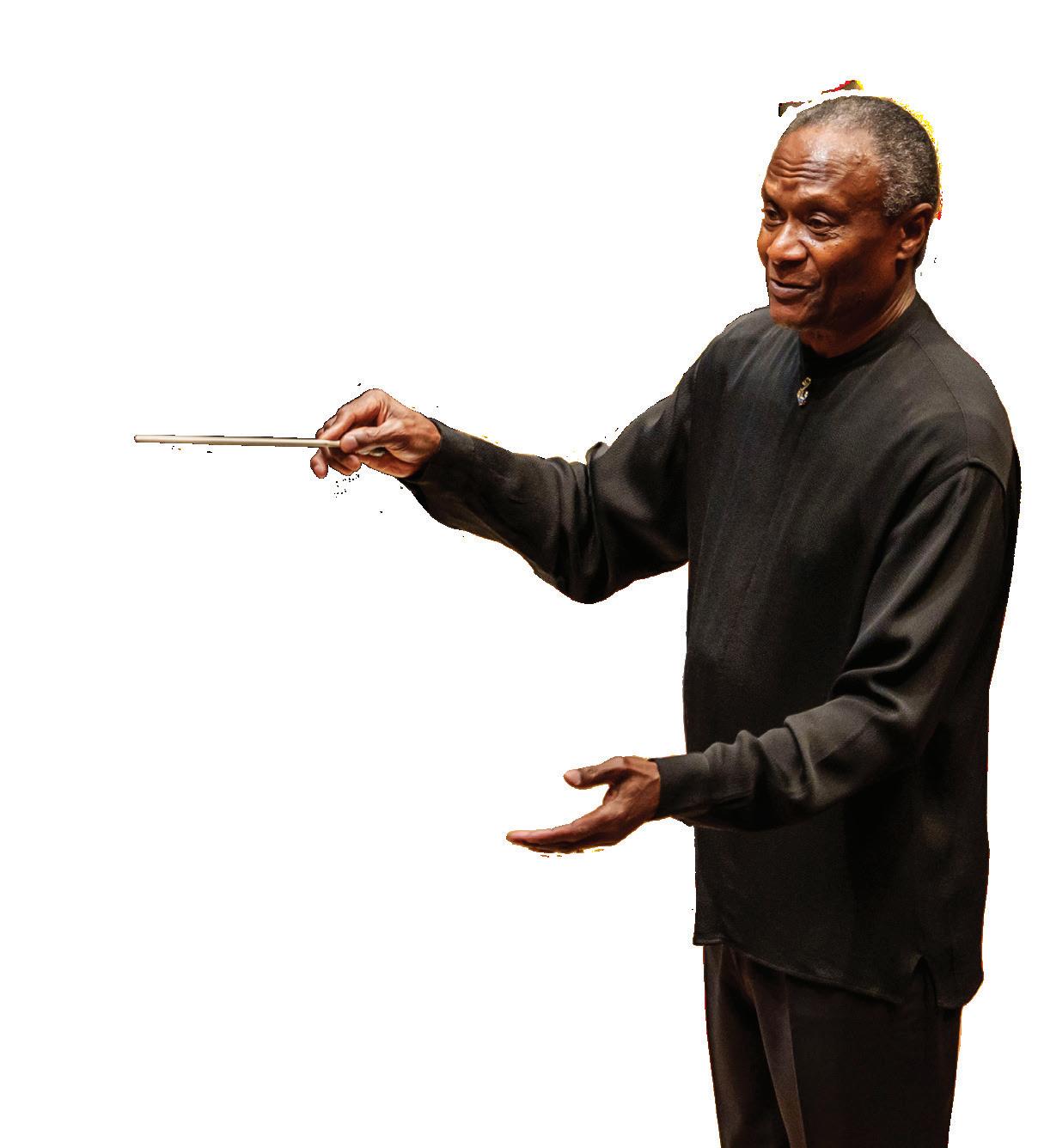
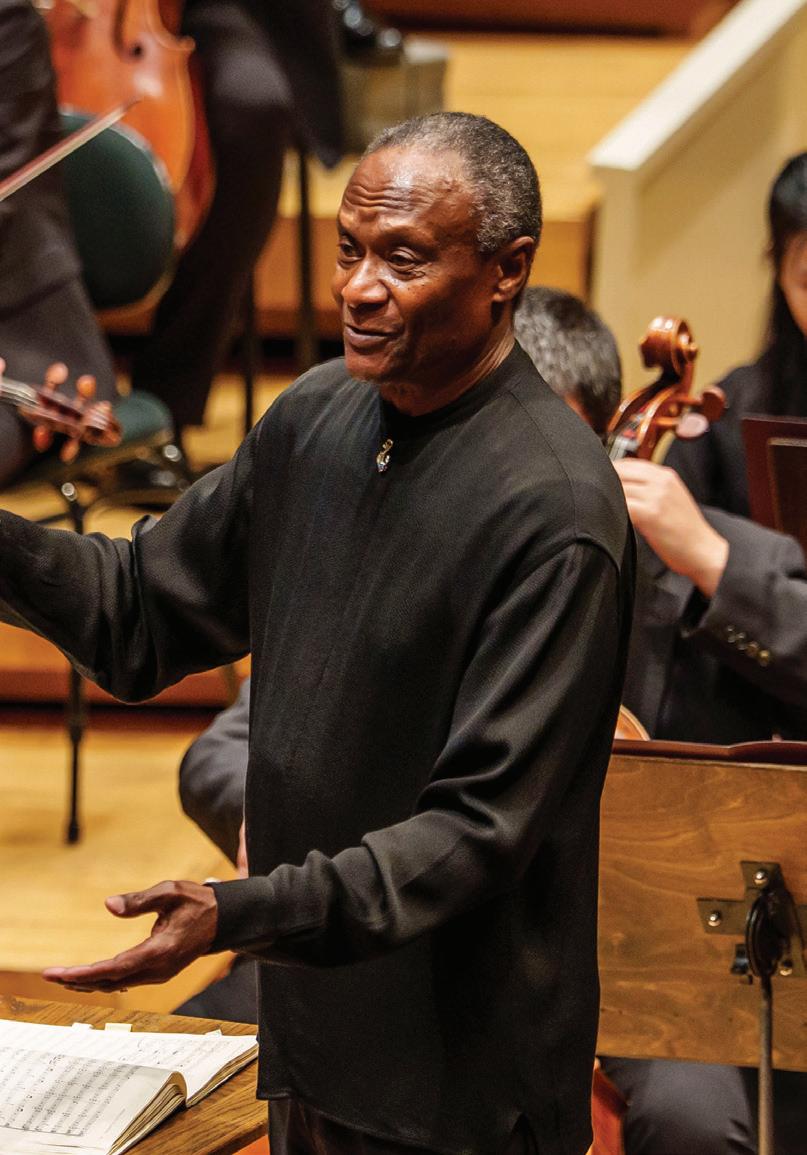
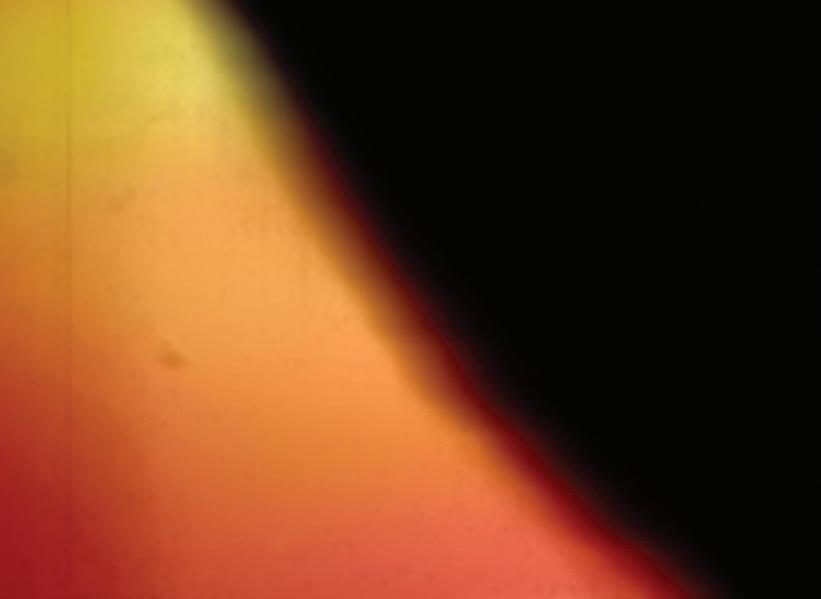
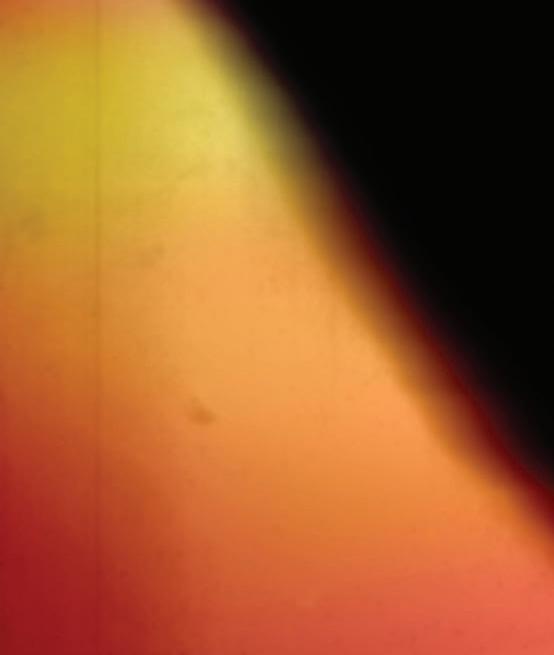
NOV 17 | 7:30
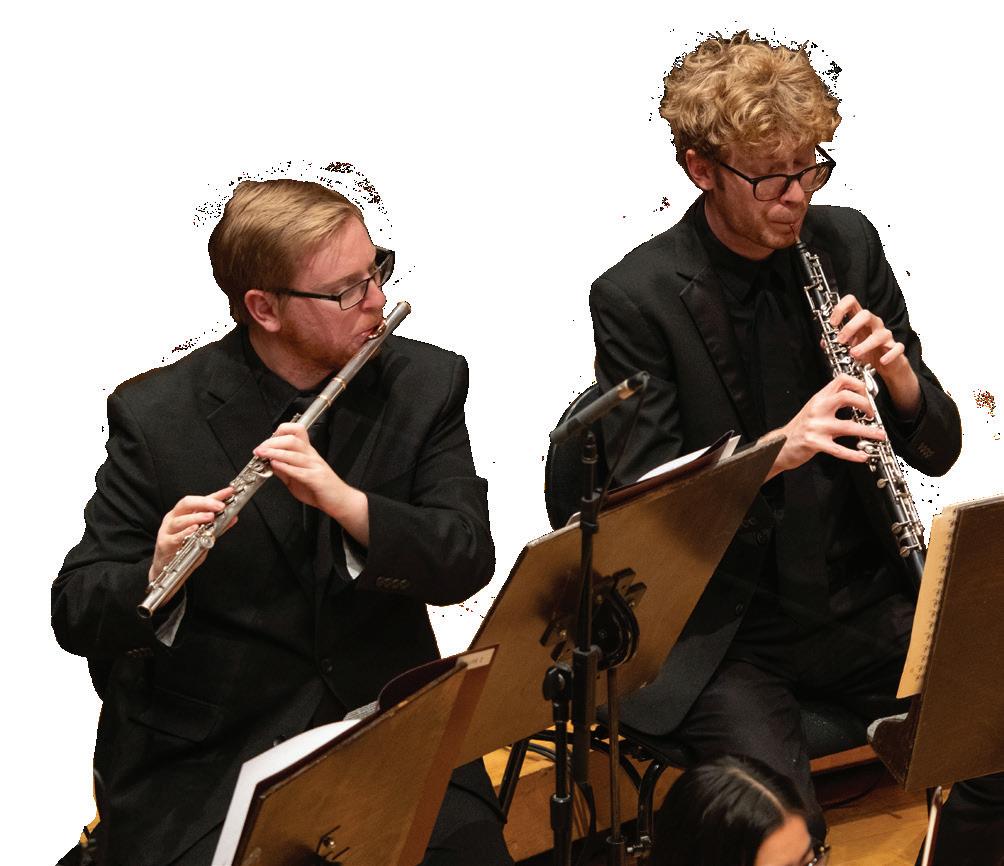
The 2025–26 Civic Orchestra season is generously sponsored by Lori Julian for the Julian Family Foundation, which also provides major funding for the Civic Fellowship program.
PROFILES
Thomas Wilkins Conductor
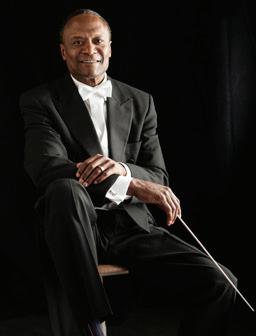
Thomas Wilkins is principal conductor of the Hollywood Bowl Orchestra, artistic partner for the Boston Symphony Orchestra’s education and community engagement, conductor of the Germeshausen Youth and Family Concerts, and principal guest conductor of the Virginia Symphony. He holds Indiana University’s Henry A. Upper Chair of Orchestral Conducting, established by the late Barbara and David Jacobs as a part of that University’s Matching the Promise Campaign. Wilkins completed his long and successful tenure as music director of the Omaha Symphony Orchestra at the close of the 2020–21 season. Other past positions have included resident conductor of the Detroit Symphony and Florida Orchestra and associate conductor of the Richmond Symphony. He has served on the music faculties of North Park University in Chicago, the University of Tennessee in Chattanooga, and Virginia Commonwealth University in Richmond.
Following his highly successful first season with the Boston Symphony, the Boston Globe named him among the Best People and Ideas of 2011. In 2014 Wilkins received the prestigious Outstanding Artist Award at the Nebraska Governor’s Arts Awards for his significant contribution to
music in the state, and in 2018, he received the Leonard Bernstein Lifetime Achievement Award for the Elevation of Music in Society conferred by Boston’s Longy School of Music. In 2019 the Virginia Symphony bestowed on Thomas Wilkins its annual Dreamer Award. In 2022 the Omaha Entertainment and Arts Awards presented him with a Lifetime Achievement Award for Music, the Boston Conservatory awarded him an honorary doctorate of arts, and he was the recipient of the League of American Orchestras’ Gold Baton Award.
Wilkins’s commitment to the community has been demonstrated by his participation on several boards of directors, including the Greater Omaha Chamber of Commerce, Charles Drew Health Center in Omaha, and the Center Against Spouse Abuse in Tampa Bay and Museum of Fine Arts and Academy Preparatory Center, both in St. Petersburg, Florida. Currently, he serves as chairman of the board for the Raymond James Charitable Endowment Fund and as national ambassador for the non-profit World Pediatric Project headquartered in Richmond, Virginia, which provides children throughout Central America and the Caribbean with critical surgical and diagnostic care.
A native of Norfolk, Virginia, Thomas Wilkins is a graduate of the Shenandoah Conservatory of Music and the New England Conservatory of Music in Boston. He and his wife, Sheri-Lee, are the proud parents of twin daughters Erica and Nicole.
PHOTO BY BILL SITZMANN
Apollo Chorus of Chicago
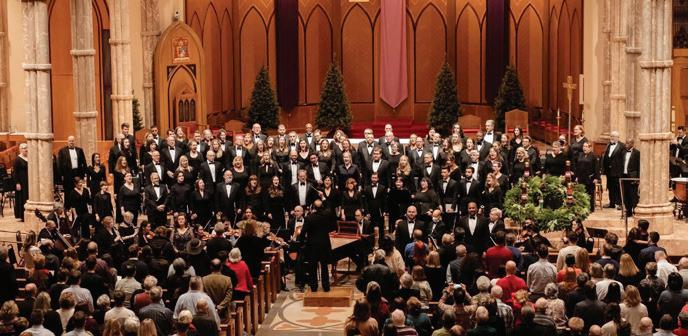
Apollo Chorus of Chicago is the oldest performing arts organization in Illinois, bringing together singers from all walks of life since 1872. The 2025–26 season marks Apollo’s 154th year providing high-quality choral music to the Chicagoland area.
Apollo’s history is inextricably tied to the history of Chicago itself. Founded in the ashes of the Great Chicago Fire, Apollo was first known as the Apollo Musical Club and was an early staple in
Apollo Chorus of Chicago
Chicago, performing at the Auditorium Theatre in December 1889 and at the dedication of Orchestra Hall in 1904. Apollo’s other crowning achievement was performing at the 1893 World’s Columbian Exposition.
Apollo Chorus has appeared with a diverse array of artists and organizations, from Louis the Child at Lollapalooza to Ravinia Festival. One of the most active presenters of contemporary choral music in the Midwest, Apollo Chorus has worked with Jeff Beal, Jeremy Beck, Eleanor Daley, Stacy Garrop, Stephen Paulus, and Eric Whitacre.
To learn more about Apollo Chorus of Chicago and celebrate its 150+ years of bringing music to life, visit apollochorus.org or follow @apollochorus on Instagram, Facebook, and YouTube.
Stephen Alltop Music Director and Conductor
Choir 1
SOPRANO 1
Claire Chalkin
Penelope Hough
Kali Jankovich
Kathy Hayevsky
Jill White
SOPRANO 2
Melissa Anderson
Alina Malin
Jen Hare
Deborah Moldover
Heather Saliny
ALTO
Johanna Hauki
Amanda Moswin
Geetha Somayajula
Caity Willox
Joan Sporny
Choir 2
SOPRANO 1
Kelly Boden
Sarah Ennis
Anna Kanle
Maddie Morrison
Katie Sayadian
SOPRANO 2
Mary Johnson
Alaina Rafferty
Kat Steffen
Sarah Steffens
Miranda Stelter
ALTO
Heather Foote
Jennifer Merry
Kelsey Payson
Sejzelle Erastus-Obilo
Ruth Thuston
Stephen Alltop Music Director and Conductor
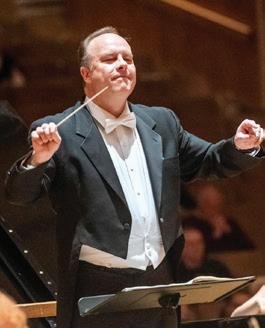
Stephen Alltop has built a career based on excellence in several disciplines, including conducting both orchestral and choral ensembles and performing as a keyboard artist. The 2025–26 season marks his twenty-ninth year as music director of the Apollo Chorus of Chicago. Alltop is the ninth music director in the 154-year history of the chorus. Under his direction, the Apollo Chorus has expanded its collaborations to include appearances with the Chicago Symphony Orchestra, Chicago Opera Theater, London Symphony Orchestra, Ravinia Festival, Peninsula Music Festival, Lollapalooza, and The Oprah Winfrey Show.
A specialist in oratorio and historical performance practice, Alltop is a member of the conducting and keyboard faculties at the Bienen School of Music at Northwestern University,
where he has conducted the Alice Millar Chapel Choir and the Baroque Music Ensemble. Stephen Alltop also serves as music director and conductor of the Elmhurst Symphony Orchestra and the Champaign-Urbana Symphony Orchestra. An advocate for diversity in programming, he has sought to bring attention to underrepresented composers in the orchestral and choral realms.
Alltop has guest-conducted numerous orchestras and choruses across the United States, Italy, and South Korea. He has worked closely with leading composers of the day, including residency projects with John Corigliano, Eleanor Daley, Stacy Garrop, Stephen Paulus, and Eric Whitacre. In 2007 he made his Carnegie Hall debut conducting the music of Eric Whitacre.
As a harpsichord and organ soloist, he has performed with the Chicago Symphony Orchestra, Joffrey Ballet, Melbourne Symphony Orchestra, Minnesota Orchestra, Milwaukee Symphony Orchestra, Omaha Symphony, Peninsula Music Festival, and Music of the Baroque of Chicago.
Civic Orchestra of Chicago
The Civic Orchestra of Chicago is a training program of the Chicago Symphony Orchestra’s Negaunee Music Institute that prepares young professionals for careers in orchestral music. It was founded during the 1919–20 season by Frederick Stock, the CSO’s second music director, as the Civic Music Student Orchestra, and for over a century, its members have gone on to secure positions in orchestras across the world, including over 160 Civic players who have joined the CSO. Each season, Civic members are given numerous performance opportunities and participate in rigorous orchestral training with its principal conductor, Ken-David Masur, distinguished guest conductors, and a faculty of coaches comprised of CSO members. Civic Orchestra musicians develop as exceptional orchestral players and engaged artists, cultivating their ability to succeed in the rapidly evolving music world.
The Civic Orchestra serves the community through its commitment to present free or low-cost concerts of the highest quality at Symphony
Center and in venues across Greater Chicago, including annual concerts at the South Shore Cultural Center and Fourth Presbyterian Church. The Civic Orchestra also performs at the annual Crain-Maling Foundation CSO Young Artists Competition and Chicago Youth in Music Festival. Many Civic concerts can be heard locally on WFMT (98.7 FM), in addition to concert clips and smaller ensemble performances available on CSOtv and YouTube. Civic musicians expand their creative, professional, and artistic boundaries and reach diverse audiences through educational performances at Chicago public schools and a series of chamber concerts at various locations throughout the city.
To further expand its musician training, the Civic Orchestra launched the Civic Fellowship program in the 2013–14 season. Each year, up to twelve Civic members are designated as Civic Fellows and participate in intensive leadership training designed to build and diversify their creative and professional skills. The program’s curriculum has four modules: artistic planning, music education, social justice, and project management.
A gift to the Civic Orchestra of Chicago supports the rigorous training that members receive throughout the season, which includes coaching from musicians of the Chicago Symphony Orchestra and world-class conductors. Your gift today ensures that the Chicago Symphony Orchestra Association will continue to enrich, inspire, and transform lives through music.
Civic Orchestra of Chicago
Ken-David Masur Principal Conductor
The Robert Kohl and Clark Pellett Principal Conductor Chair
VIOLINS
Sage Chen
Alba Layana Izurieta
Kimberly Bill+
Evan Chen
Jenny Choi*
Alyssa Goh
Ben Koenig
Pavlo Kyryliuk
Oliver Leitner
Mona Mierxiati
Tricia Park
Hobart Shi
Mia Smith
Keshav Srinivasan
Jingjia Wang
Abigail Yoon
Naomi Powers
Ebedit Fonseca
Maria Paula Bernal
Carlos Chacon
Adam Davis
Naomi Folwick
Rose Haselhorst
John Heo
Hojung Christina Lee
June Lee
Lara Madden Hughes
Sean Qin
Justine Jing Xin Teo*
Lina Yamin
VIOLAS
Sava Velkoff*
Darren Carter
Lucie Boyd
Eugene Chin
Jacob Davis
August DuBeau
Elena Galentas
Judy Huang
Matthew Nowlan**
Yat Chun Justin Pou
Mason Spencer*
CELLOS
Ashley Ryoo
David Caplan
Krystian Chiu
J Holzen*
Buianto Lkhasaranov
Henry Lin
Nick Reeves
Somyong Shin
Brandon Xu
Shun-Ming Yang
BASSES
Tony Sanfilippo Jr.
Jared Prokop
Albert Daschle
Walker Dean
Gisel Dominguez
Bennett Norris
Jonathon Piccolo
Alexander Wallack
FLUTES
Isabel Evernham
Daniel Fletcher
Xander Day
Elena Rubin
ALTO FLUTE
Daniel Fletcher
PICCOLOS
Elena Rubin
Daniel Fletcher
OBOES
Will Stevens
Orlando Salazar*
Guillermo Ulloa
ENGLISH HORNS
Orlando Salazar*
Hannah Fusco
BASS OBOE
Orlando Salazar*
CLARINETS
Max Reese
Elizabeth Kapitaniuk
Henry Lazzaro
BASS CLARINETS
Elizabeth Kapitaniuk
Nathan Vilhena Kock
BASSOONS
Peter Ecklund
Hannah Dickerson
Benjamin Richard
CONTRABASSOON
Finn McCune
HORNS
Micah Northam
Emmett Conway
Layan Atieh
Lauren Goff
Erin Harrigan
Kathryn Meffert
Eden Stargardt*
TRUMPETS
Hamed Barbarji*
Sean-David Whitworth
Maria Merlo
Abner Wong
TROMBONES
Arlo Hollander
Dustin Nguyen
BASS TROMBONE
Timothy Warner
EUPHONIUM
Oliver Stark
TUBA
Chrisjovan Masso
TIMPANI
Kyle Scully
Kevin Tan
PERCUSSION
Tae McLoughlin
Taylor Hampton+
Adriana Harrison
Amy Lee
PIANO
Daniel Szefer
CELESTA
Daniel Szefer
ORGAN
Tyler Kivel
HARPS
Kari Novilla*
Zora Evangeline Dickson
LIBRARIAN
Andrew Wunrow
* Civic Orchestra Fellow + Civic Orchestra Alumni ** NMI Arts Administration Fellow
NEGAUNEE MUSIC INSTITUTE AT THE CSO
The Negaunee Music Institute connects people to the extraordinary musical resources of the Chicago Symphony Orchestra. Institute programs educate audiences, train young musicians, and serve diverse communities across Chicago and around the world.
Current Negaunee Music Institute programs include an extensive series of CSO School and Family Concerts and open rehearsals; more than seventy-five in-depth school partnerships; online learning resources; the Civic Orchestra of Chicago, a prestigious ensemble for earlycareer musicians; intensive training and performance opportunities for youth, including the Percussion Scholarship Program, Chicago Youth in Music Festival, Crain-Maling Foundation CSO Young Artists Competition, and Young Composers Initiative; social impact initiatives, such as collaborations with Chicago Refugee Coalition and Notes for Peace for families who have lost loved ones to gun violence; and music education activities during CSO domestic and international tours.
the board of the negaunee music institute
Leslie Burns Chair
Steve Shebik Vice Chair
John Aalbregtse
David Arch
James Borkman
Jacqui Cheng
Ricardo Cifuentes
Richard Colburn
Charles Emmons
Judy Feldman
Toni-Marie Montgomery
Rumi Morales
Mimi Murley
Margo Oberman
Gerald Pauling
Kate Protextor Drehkoff
Harper Reed
Melissa Root
Amanda Sonneborn
Eugene Stark
Dan Sullivan
Paul Watford
Ex Officio Members
Jeff Alexander
Jonathan McCormick
Vanessa Moss
negaunee music institute administration
Jonathan McCormick Managing Director
Katy Clusen Associate Director, CSO for Kids
Katherine Eaton Coordinator, School Partnerships
Carol Kelleher Assistant, CSO for Kids
Anna Perkins Orchestra Manager, Civic Orchestra of Chicago
Zhiqian Wu Operations Coordinator, Civic Orchestra of Chicago
Rachael Cohen Program Manager
Charles Jones Program Assistant
Kevin Gupana Associate Director, Education & Community Engagement Giving
Frances Atkins Director of Publications and Institutional Content
Kristin Tobin Designer & Print Production Manager
Petya Kaltchev Editor
civic orchestra artistic leadership
Ken-David Masur Principal Conductor
The Robert Kohl and Clark Pellett Principal Conductor Chair
Coaches from the Chicago Symphony Orchestra
Robert Chen Concertmaster
The Louis C. Sudler Chair, endowed by an anonymous benefactor
Baird Dodge Principal Second Violin
Teng Li Principal Viola
The Paul Hindemith Principal Viola Chair
Brant Taylor Cello
The Ann Blickensderfer and Roger Blickensderfer Chair
Alexander Horton Assistant Principal Bass
William Welter Principal Oboe
Stephen Williamson Principal Clarinet
Keith Buncke Principal Bassoon
William Buchman Assistant Principal Bassoon
Mark Almond Principal Horn
Esteban Batallán Principal Trumpet
The Adolph Herseth Principal Trumpet Chair, endowed by an anonymous benefactor
Michael Mulcahy Trombone
Charles Vernon Bass Trombone
Gene Pokorny Principal Tuba
The Arnold Jacobs Principal Tuba Chair, endowed by Christine Querfeld
David Herbert Principal Timpani
The Clinton Family Fund Chair
Cynthia Yeh Principal Percussion
Justin Vibbard Principal Librarian
CIVIC ORCHESTRA OF CHICAGO SCHOLARSHIPS
Members of the Civic Orchestra receive an annual stipend to offset some of their living expenses during their training. The following donors have generously helped to support these stipends for the 2025–26 season.
Ten Civic members participate in the Civic Fellowship program, a rigorous artistic and professional development curriculum that supplements their membership in the full orchestra. Major funding for this program is generously provided by Lori Julian for the Julian Family Foundation
Nancy Abshire
Darren Carter, viola
Dr. & Mrs. Bernard H. Adelson Fund
Elena Galentas, viola
Robert & Isabelle Bass Foundation, Inc.
Timothy Warner, bass trombone
Rosalind Britton^
Ashley Ryoo, cello
Leslie and John Burns**
Matthew Nowlan, viola
Robert and Joanne Crown Fund
Alyssa Goh, violin
John Heo, violin
Pavlo Kyryliuk, violin
Buianto Lkhasaranov, cello
Matthew Musachio, violin
Mr.† & Mrs. David Donovan
Chrisjovan Masso, tuba
Charles and Carol Emmons^
Will Stevens, oboe
Mr. & Mrs. David S. Fox^
Daniel Fletcher, flute
Paul and Ellen Gignilliat
Naomi Powers, violin
Joseph and Madeleine Glossberg
Adam Davis, violin
Richard and Alice Godfrey
Ben Koenig, violin
Jennifer Amler Goldstein Fund, in memory of Thomas M. Goldstein
Alex Chao, percussion
Chester Gougis and Shelley Ochab
Peter Ecklund, bassoon
Mary Green
Walker Dean, bass
Jane Redmond Haliday Chair
Mona Mierxiati, violin
Lori Julian for the Julian Family Foundation
David Caplan, cello
Orlando Salazar,* oboe
Lester B. Knight Trust
Tricia Park, violin
Jonathon Piccolo, bass
Brandon Xu, cello
Shun-Ming Yang, cello
The League of the Chicago Symphony Orchestra
Kari Novilla,* harp
Phil Lumpkin and William Tedford
Mason Spencer,* viola
Glenn Madeja and Janet Steidl
Erin Harrigan, horn
Maval Foundation
Arlo Hollander, trombone
Dustin Nguyen, trombone
Sean-David Whitworth, trumpet
Judy and Scott McCue and the Fry Foundation
Cierra Hall, flute
Leslie Fund, Inc.
Cameron Marquez,* percussion
Leo and Catherine † Miserendino
Sava Velkoff,* viola
Ms. Susan Norvich
Yulia Watanabe-Price, violin
Margo and Mike Oberman
Hamed Barbarji,* trumpet
Julian Oettinger^
Kyle Scully, timpani
Bruce Oltman and Bonnie McGrath†^
Alexander Wallack, bass
Earl† and Sandra Rusnak
Ebedit Fonseca, violin
Barbara and Barre Seid Foundation
Emmett Conway, horn
Micah Northam, horn
The George L. Shields Foundation, Inc.
Abigail Yoon, violin
Yat Chun Justin Pou, viola
Guillermo Ulloa, oboe
Dr. & Mrs. R. J. Solaro
Sanford Whatley, viola
David W. and Lucille G. Stotter Chair
Mia Smith, violin
Ruth Miner Swislow Charitable Fund
Rose Haselhorst, violin
Ms. Liisa Thomas and Mr. Stephen Pratt
Nick Reeves, cello
Peter and Ksenia Turula
Abner Wong, trumpet
Lois and James Vrhel
Endowment Fund
Albert Daschle, double bass
Paul and Lisa Wiggin
Eden Stargardt,* horn
Marylou Witz
Justine Jing Xin Teo,* violin
Women’s Board of the Chicago Symphony Orchestra Association
Elizabeth Kapitinuk, clarinet
Anonymous J Holzen,* cello
Anonymous^
Carlos Chacon, violin
Anonymous
Hojung Christina Lee, violin
Anonymous
Layan Atieh, horn
